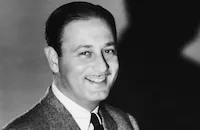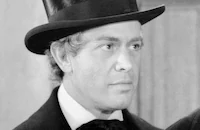All American Chump

Brief Synopsis
Cast & Crew
Edwin L. Marin
Stuart Erwin
Robert Armstrong
Betty Furness
Edmund Gwenn
Harvey Stephens
Film Details
Technical Specs

Synopsis
Elmer Lamb, a timid bank clerk who can add faster than a machine, comes to the attention of circus pitchman "Honest" William Hogan, who wants to bill him as "the human adding machine." Elmer takes the job because he wants to save enough to buy some cows and a dairy farm. When the circus is closed by the sheriff for non-payment of bills, Elmer, Bill and circus owner Jeffrey Crane and his daughter Kitty head East to exploit Elmer's genius further. On the train, one of the passengers, Pudgy Murphy, drags Elmer into a bridge game with him, bridge champion J. Montgomery Brantley and a Broadway columnist. While Bill, Jeff and Kitty discuss publicity stunts for Elmer, Elmer bashfully wins a fortune with Pudgy. Though Elmer doesn't see anything unusual in this, when the train arrives, reporters greet Brantley, who admits that the front page news article on "Chain Lightning" Elmer's bridge prowess is true. Reporters revel in stories about the "hick" who beat the champion, while Crawford, Brantley's manager, wants Bill to set up a re-match between the two, and eventually offers $15,000. While Kitty and Bill are settling the deal, Jeff, who is an alcoholic, and Pudgy get Elmer drunk on spiked lemonade and Jeff "sells" Elmer to Pudgy for seventy-five dollars. Pudgy then sells half interest in Elmer to gangster Al, but Bill later assures Pudgy that he owns Elmer's contract. Meanwhile, Al approaches Crawford and suggests that Elmer lose the match for $10,000. Though Crawford agrees, when Pudgy finds out, he is afraid of what Al will do to him if he discovers that Elmer actually belongs to Bill and advises him to have Elmer throw the game. During the week-long, fifty rubber match, which is being broadcast over the radio, Pudgy admits to Al that Elmer refuses to deliberately lose. Al then decides to take charge and kidnaps Elmer, who thinks that he is going to visit Al's sick cow. Elmer's simple ways baffle Al and the boys, who get no place with their threats and are captured by the police after Kitty and Bill report the kidnapping. In the melee, Jeff accidentally knocks Elmer unconscious and when he awakens, his mathematical sense is gone. Because it is the final day of the match, Bill suggests another blow on the head to put him right, over soft-hearted Kitty's protests, but it doesn't work. Jeff then suggests that Elmer's infatuation with Kitty might offer a solution and coerces Kitty into playing up to him. Kitty is ashamed of herself, but it works, and Elmer's recovered powers result in his winning the match. Kitty then tells Bill that she is going through with her promised marriage to Elmer at the same time Jeff is telling Elmer about the ruse. After Elmer confronts them, he returns home and asks for his job back, but he has been replaced by an adding machine. As Elmer sadly says goodby to his beloved cows, Kitty shows up and reveals that she has used his winnings to buy the farm and they decide to go milking together.

Director

Edwin L. Marin
Cast

Stuart Erwin

Robert Armstrong

Betty Furness

Edmund Gwenn

Harvey Stephens

Edward Brophy

E. E. Clive
Dewey Robinson
Eddie Shubert
Spencer Charters
George Chandler
Harry Wilson
Harry C. Bradley
Erville Alderson
Bobby Watson
Franklin Parker
Wally Maher
Frank Faylen
Harvey Clark
Nat Carr
Tyler Brooke
Harry Lash
Louis Mason
Crew
Dr. William Axt
William Brockway
Charles [g.] Clarke
Michael Fessier
Cedric Gibbons
Lucien Hubbard
Frank E. Hull
Lawrence Kimble
Harry Mcafee
Douglas Shearer
Al Shenberg
Edwin B. Willis

Film Details
Technical Specs

Articles
The All-American Chump
By Frank Miller

The All-American Chump
Quotes
Trivia
Notes
The film's working titles were, Chain LIghtning, Where's Elmer? and Where Is Elmer? A production chart in Hollywood Reporter incorrectly identified the cameraman as Lester Clarke.















